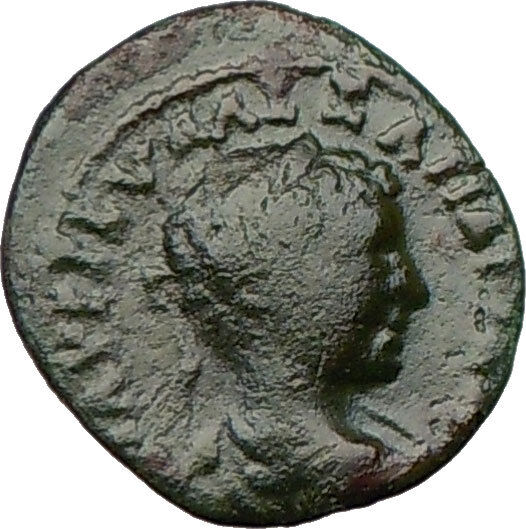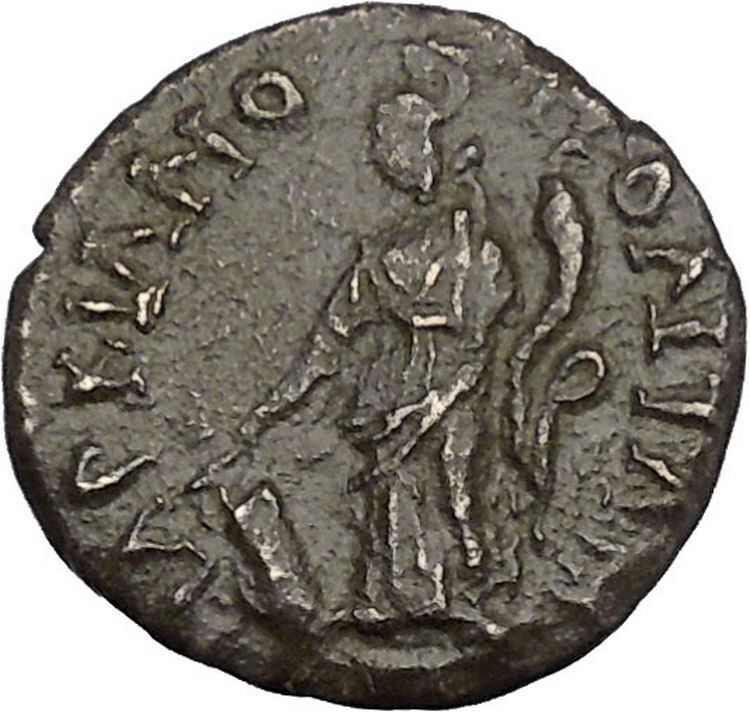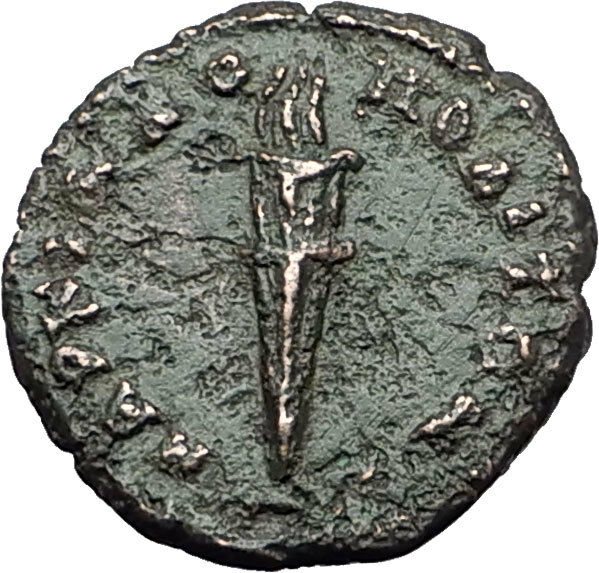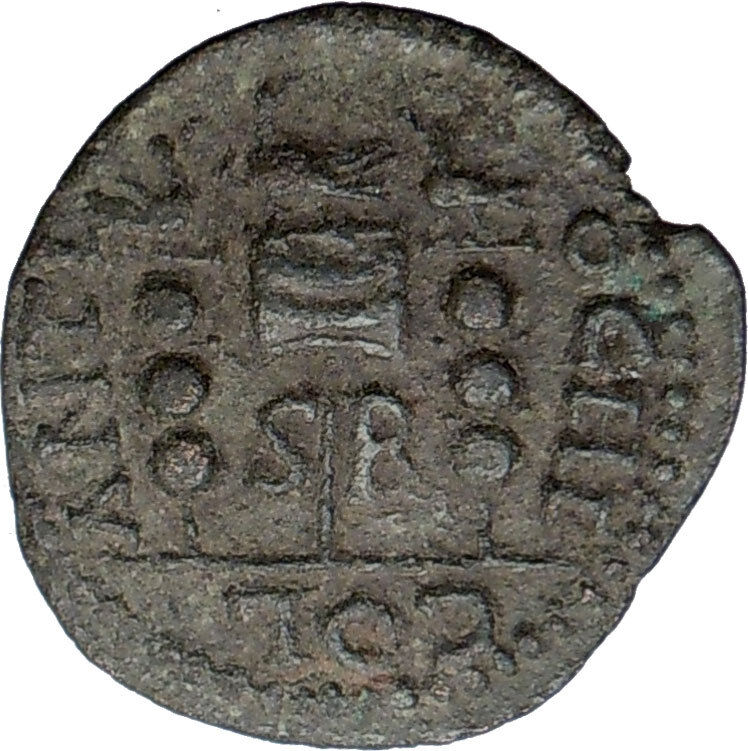|
Commodus – Roman Emperor: 177-192 A.D.
Bronze 16mm (2.5 grams) of Nicopolis ad Istrum in Moesia Inferior
Laureate head right.
Tyche standing facing, holding rudder and cornucopia.
You are bidding on the exact item pictured, provided with a Certificate of Authenticity and Lifetime Guarantee of Authenticity.
 Tyche (meaning “luck”; Roman equivalent: Fortuna) was the presiding tutelary deity that governed the fortune and prosperity of a city, its destiny. She is the daughter of Aphrodite and Zeus or Hermes. Tyche (meaning “luck”; Roman equivalent: Fortuna) was the presiding tutelary deity that governed the fortune and prosperity of a city, its destiny. She is the daughter of Aphrodite and Zeus or Hermes.
In literature, she might be given various genealogies, as a daughter of Hermes and Aphrodite, or considered as one of the Oceanids, daughters of Oceanus and Tethys, or of Zeus. She was connected with Nemesis and Agathos Daimon (“good spirit”).
The Greek historian Polybius believed that when no cause can be discovered to events such as floods, droughts, frosts or even in politics, then the cause of these events may be fairly attributed to Tyche.
Worship
Increasingly during the Hellenistic period, cities venerated their own specific iconic version of Tyche, wearing a mural crown (a crown like the walls of the city).
Tyche had temples at Caesarea Maritima, Antioch, Alexandria and Constantinople. In Alexandria the Tychaeon, the temple of Tyche, was described by Libanius as one of the most magnificent of the entire Hellenistic world.
She was uniquely venerated at Itanos in Crete, as Tyche Protogeneia, linked with the Athenian Protogeneia (“firstborn”), daughter of Erechtheus, whose self-sacrifice saved the city.
Stylianos Spyridakis concisely expressed Tyche’s appeal in a Hellenistic world of arbitrary violence and unmeaning reverses: “In the turbulent years of the Epigoni of Alexander, an awareness of the instability of human affairs led people to believe that Tyche, the blind mistress of Fortune, governed mankind with an inconstancy which explained the vicissitudes of the time.”
Depictions
Tyche appears on many coins of the Hellenistic period in the three centuries before the Christian era, especially from cities in the Aegean. Unpredictable turns of fortune drive the complicated plotlines of Hellenistic romances, such as Leucippe and Clitophon or Daphnis and Chloe. She experienced a resurgence in another era of uneasy change, the final days of publicly sanctioned Paganism, between the late-fourth-century emperors Julian and Theodosius I who definitively closed the temples. The effectiveness of her capricious power even achieved respectability in philosophical circles during that generation, though among poets it was a commonplace to revile her for a fickle harlot.
In medieval art, she was depicted as carrying a cornucopia, an emblematic ship’s rudder, and the wheel of fortune, or she may stand on the wheel, presiding over the entire circle of fate.
The constellation of Virgo is sometimes identified as the heavenly figure of Tyche, as well as other goddesses such as Demeter and Astraea.
Commodus – Roman Emperor: 177-192 A.D.
Caesar: 166-177 A.D. (under Marcus Aurelius) | (166-169/170 A.D. with Annius Verus) | (169/170-177 Alone) |
Augustus: 177-192 A.D. (177-180 A.D. with Marcus Aurelius) (180-192 A.D. Sole Reign)
Son of Marcus Aurelius and Faustina Junior | Husband of Crispina | Brother of Annius Verus, Lucilla and Aurelius Antoninus | Grandson of Antoninus Pius and Faustina Senior |
 Commodus (Latin: Marcus Aurelius Commodus Antoninus Augustus; 31 August, 161 AD – 31 December, 192 AD), was Roman Emperor from 180 to 192. He also ruled as co-emperor with his father Marcus Aurelius from 177 until his father’s death in 180. Commodus (Latin: Marcus Aurelius Commodus Antoninus Augustus; 31 August, 161 AD – 31 December, 192 AD), was Roman Emperor from 180 to 192. He also ruled as co-emperor with his father Marcus Aurelius from 177 until his father’s death in 180.
His accession as emperor was the first time a son had succeeded his father since Titus succeeded Vespasian in 79. He was also the first Emperor to have both a father and grandfather as the two preceding Emperors. Commodus was the first (and until 337 the only) emperor “born in the purple”; i.e. during his father’s reign.
Commodus was assassinated in 192.
Early life and rise to power (161-180)
Commodus was born on 31 August 161, as Commodus, in Lanuvium, near Rome. He was the son of the reigning emperor, Marcus Aurelius, and Aurelius’s first cousin, Faustina the Younger; the youngest daughter of Roman Emperor Antonius Pius. Commodus had an elder twin brother, Titus Aurelius Fulvus Antoninus, who died in 165. On 12 October 166, Commodus was made Caesar together with his younger brother, Marcus Annius Verus. The latter died in 169 having failed to recover from an operation, which left Commodus as Marcus Aurelius’ sole surviving son.
He was looked after by his father’s physician, Galen, in order to keep Commodus healthy and alive. Galen treated many of Commodus’ common illnesses. Commodus received extensive tuition at the hands of what Marcus Aurelius called “an abundance of good masters.” The focus of Commodus’ education appears to have been intellectual, possibly at the expense of military training.
Commodus is known to have been at Carnuntum, the headquarters of Marcus Aurelius during the Marcomannic Wars, in 172. It was presumably there that, on 15 October 172, he was given the victory title Germanicus, in the presence of the army. The title suggests that Commodus was present at his father’s victory over the Marcomanni. On 20 January 175, Commodus entered the College of Pontiffs, the starting point of a career in public life.
In April 175, Avidius Cassius, Governor of Syria, declared himself Emperor following rumors that Marcus Aurelius had died. Having been accepted as Emperor by Syria, Palestine and Egypt, Cassius carried on his rebellion even after it had become obvious that Marcus was still alive. During the preparations for the campaign against Cassius, the Prince assumed his toga virilis on the Danubian front on 7 July 175, thus formally entering adulthood. Cassius, however, was killed by one of his centurions before the campaign against him could begin.
Commodus subsequently accompanied his father on a lengthy trip to the Eastern provinces, during which he visited Antioch. The Emperor and his son then traveled to Athens, where they were initiated into the Eleusinian mysteries. They then returned to Rome in the Autumn of 176.
Joint rule with father (177)
Marcus Aurelius was the first emperor since Vespasian to have a biological son of his own and, though he himself was the fifth in the line of the so-called Five Good Emperors, each of whom had adopted his successor, it seems to have been his firm intention that Commodus should be his heir. On 27 November 176, Marcus Aurelius granted Commodus the rank of Imperator and, in the middle of 177, the title Augustus, giving his son the same status as his own and formally sharing power.
On 23 December of the same year, the two Augusti celebrated a joint triumph, and Commodus was given tribunician power. On 1 January 177, Commodus became consul for the first time, which made him, aged 15, the youngest consul in Roman history up to that time. He subsequently married Bruttia Crispina before accompanying his father to the Danubian front once more in 178, where Marcus Aurelius died on 17 March 180, leaving the 18-year-old Commodus sole emperor.
Sole reign (180-192)
Upon his accession Commodus devalued the Roman currency. He reduced the weight of the denarius from 96 per Roman pound to 105 (3.85 grams to 3.35 grams). He also reduced the silver purity from 79 percent to 76 percent – the silver weight dropping from 2.57 grams to 2.34 grams. In 186 he further reduced the purity and silver weight to 74 percent and 2.22 grams respectively, being 108 to the Roman pound. His reduction of the denarius during his rule was the largest since the empire’s first devaluation during Nero’s reign.
Whereas the reign of Marcus Aurelius had been marked by almost continuous warfare, that of Commodus was comparatively peaceful in the military sense but was marked by political strife and the increasingly arbitrary and capricious behaviour of the emperor himself. In the view of Dio Cassius, a contemporary observer, his accession marked the descent “from a kingdom of gold to one of rust and iron” – a famous comment which has led some historians, notably Edward Gibbon, to take Commodus’s reign as the beginning of the decline of the Roman Empire.
Despite his notoriety, and considering the importance of his reign, Commodus’s years in power are not well chronicled. The principal surviving literary sources are Dio Cassius (a contemporary and sometimes first-hand observer, but for this reign, only transmitted in fragments and abbreviations), Herodian and the Historia Augusta (untrustworthy for its character as a work of literature rather than history, with elements of fiction embedded within its biographies; in the case of Commodus, it may well be embroidering upon what the author found in reasonably good contemporary sources).
Commodus remained with the Danube armies for only a short time before negotiating a peace treaty with the Danubian tribes. He then returned to Rome and celebrated a triumph for the conclusion of the wars on 22 October 180. Unlike the preceding Emperors Trajan, Hadrian, Antoninus Pius and Marcus Aurelius, he seems to have had little interest in the business of administration and tended throughout his reign to leave the practical running of the state to a succession of favourites, beginning with Saoterus, a freedman from Nicomedia who had become his chamberlain.
Dissatisfaction with this state of affairs would lead to a series of conspiracies and attempted coups, which in turn eventually provoked Commodus to take charge of affairs, which he did in an increasingly dictatorial manner. Nevertheless, though the senatorial order came to hate and fear him, the evidence suggests that he remained popular with the army and the common people for much of his reign, not least because of his lavish shows of largesse (recorded on his coinage) and because he staged and took part in spectacular gladiatorial combats.
One of the ways he paid for his donatives and mass entertainments was to tax the senatorial order, and on many inscriptions, the traditional order of the two nominal powers of the state, the Senate and People (Senatus Populusque Romanus) is provocatively reversed (Populus Senatusque…).
The conspiracies of 182
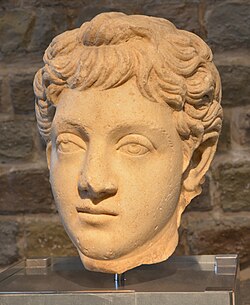 A bust of Commodus as a youth (Roman-Germanic Museum, Cologne). A bust of Commodus as a youth (Roman-Germanic Museum, Cologne).
At the outset of his reign, Commodus, age 18, inherited many of his father’s senior advisers, notably Tiberius Claudius Pompeianus (the second husband of Commodus’s sister Lucilla), his father-in-law Gaius Bruttius Praesens, Titus Fundanius Vitrasius Pollio, and Aufidius Victorinus, who was Prefect of the City of Rome. He also had five surviving sisters, all of them with husbands who were potential rivals. Four of his sisters were considerably older than he; the eldest, Lucilla, held the rank of Augusta as the widow of her first husband, Lucius Verus.
The first crisis of the reign came in 182, when Lucilla engineered a conspiracy against her brother. Her motive is alleged to have been envy of the Empress Crispina. Her husband, Pompeianus, was not involved, but two men alleged to have been her lovers, Marcus Ummidius Quadratus Annianus (the consul of 167, who was also her first cousin) and Appius Claudius Quintianus, attempted to murder Commodus as he entered the theatre. They bungled the job and were seized by the emperor’s bodyguard.
Quadratus and Quintianus were executed. Lucilla was exiled to Capri and later killed. Pompeianus retired from public life. One of the two praetorian prefects, Tarrutenius Paternus, had actually been involved in the conspiracy but was not detected at this time, and in the aftermath, he and his colleague Sextus Tigidius Perennis were able to arrange for the murder of Saoterus, the hated chamberlain.
Commodus took the loss of Saoterus badly, and Perennis now seized the chance to advance himself by implicating Paternus in a second conspiracy, one apparently led by Publius Salvius Julianus, who was the son of the jurist Salvius Julianus and was betrothed to Paternus’s daughter. Salvius and Paternus were executed along with a number of other prominent consulars and senators. Didius Julianus, the future emperor, a relative of Salvius Julianus, was dismissed from the governorship of Germania Inferior.
Cleander
Perennis took over the reins of government and Commodus found a new chamberlain and favourite in Cleander, a Phrygian freedman who had married one of the emperor’s mistresses, Demostratia. Cleander was in fact the person who had murdered Saoterus. After those attempts on his life, Commodus spent much of his time outside Rome, mostly on the family estates at Lanuvium. Being physically strong, his chief interest was in sport: taking part in horse racing, chariot racing, and combats with beasts and men, mostly in private but also on occasion in public.
Dacia and Britain
 A bust of Commodus (Kunsthistorisches Museum, Vienna). According to Herodian he was well proportioned and attractive, with naturally blonde and curly hair. A bust of Commodus (Kunsthistorisches Museum, Vienna). According to Herodian he was well proportioned and attractive, with naturally blonde and curly hair.
Commodus was inaugurated in 183 as consul with Aufidius Victorinus for a colleague and assumed the title Pius. War broke out in Dacia: few details are available, but it appears two future contenders for the throne, Clodius Albinus and Pescennius Niger, both distinguished themselves in the campaign. Also, in Britain in 184, the governor Ulpius Marcellus re-advanced the Roman frontier northward to the Antonine Wall, but the legionaries revolted against his harsh discipline and acclaimed another legate, Priscus, as emperor.
Priscus refused to accept their acclamations, but Perennis had all the legionary legates in Britain cashiered. On 15 October 184 at the Capitoline Games, a Cynic philosopher publicly denounced Perennis before Commodus, who was watching, but was immediately put to death. According to Dio Cassius, Perennis, though ruthless and ambitious, was not personally corrupt and generally administered the state well.
However, the following year, a detachment of soldiers from Britain (they had been drafted to Italy to suppress brigands) also denounced Perennis to the emperor as plotting to make his own son emperor (they had been enabled to do so by Cleander, who was seeking to dispose of his rival), and Commodus gave them permission to execute him as well as his wife and sons. The fall of Perennis brought a new spate of executions: Aufidius Victorinus committed suicide. Ulpius Marcellus was replaced as governor of Britain by Pertinax; brought to Rome and tried for treason, Marcellus narrowly escaped death.
Cleander’s zenith and fall (185-190)
Cleander proceeded to concentrate power in his own hands and to enrich himself by becoming responsible for all public offices: he sold and bestowed entry to the Senate, army commands, governorships and, increasingly, even the suffect consulships to the highest bidder. Unrest around the empire increased, with large numbers of army deserters causing trouble in Gaul and Germany. Pescennius Niger mopped up the deserters in Gaul in a military campaign, and a revolt in Brittany was put down by two legions brought over from Britain.
In 187, one of the leaders of the deserters, Maternus, came from Gaul intending to assassinate Commodus at the Festival of the Great Goddess in March, but he was betrayed and executed. In the same year, Pertinax unmasked a conspiracy by two enemies of Cleander – Antistius Burrus (one of Commodus’s brothers-in-law) and Arrius Antoninus. As a result, Commodus appeared even more rarely in public, preferring to live on his estates.
Early in 188, Cleander disposed of the current praetorian prefect, Atilius Aebutianus, and himself took over supreme command of the Praetorians at the new rank of a pugione (“dagger-bearer”) with two praetorian prefects subordinate to him. Now at the zenith of his power, Cleander continued to sell public offices as his private business. The climax came in the year 190, which had 25 suffect consuls – a record in the 1000-year history of the Roman consulship-all appointed by Cleander (they included the future Emperor Septimius Severus).
In the spring of 190, Rome was afflicted by a food shortage, for which the praefectus annonae Papirius Dionysius, the official actually in charge of the grain supply, contrived to lay the blame on Cleander. At the end of June, a mob demonstrated against Cleander during a horse race in the Circus Maximus: he sent the praetorian guard to put down the disturbances, but Pertinax, who was now City Prefect of Rome, dispatched the Vigiles Urbani to oppose them. Cleander fled to Commodus, who was at Laurentum in the house of the Quinctilii, for protection, but the mob followed him calling for his head.
At the urging of his mistress Marcia, Commodus had Cleander beheaded and his son killed. Other victims at this time were the praetorian prefect Julius Julianus, Commodus’s cousin Annia Fundania Faustina, and his brother-in-law Mamertinus. Papirius Dionysius was executed too.
The emperor now changed his name to Lucius Aelius Aurelius Commodus. At 29, he took over more of the reins of power, though he continued to rule through a cabal consisting of Marcia, his new chamberlain Eclectus, and the new praetorian prefect Quintus Aemilius Laetus, who about this time also had many Christians freed from working in the mines in Sardinia. Marcia, the widow of Quadratus, who had been executed in 182, is alleged to have been a Christian.
Megalomania (190-192)
In opposition to the Senate, in his pronouncements and iconography, Commodus had always laid stress on his unique status as a source of god-like power, liberality and physical prowess. Innumerable statues around the empire were set up portraying him in the guise of Hercules, reinforcing the image of him as a demigod, a physical giant, a protector and a battler against beasts and men (see “Commodus and Hercules” and “Commodus the Gladiator” below). Moreover, as Hercules, he could claim to be the son of Jupiter, the representative of the supreme god of the Roman pantheon. These tendencies now increased to megalomaniac proportions. Far from celebrating his descent from Marcus Aurelius, the actual source of his power, he stressed his own personal uniqueness as the bringer of a new order, seeking to re-cast the empire in his own image.
During 191, the city of Rome was extensively damaged by a fire that raged for several days, during which many public buildings including the Temple of Pax, the Temple of Vesta and parts of the imperial palace were destroyed.
Perhaps seeing this as an opportunity, early in 192 Commodus, declaring himself the new Romulus, ritually re-founded Rome, renaming the city Colonia Lucia Annia Commodiana. All the months of the year were renamed to correspond exactly with his (now twelve) names: Lucius, Aelius, Aurelius, Commodus, Augustus, Herculeus, Romanus, Exsuperatorius, Amazonius, Invictus, Felix, Pius. The legions were renamed Commodianae, the fleet which imported grain from Africa was termed Alexandria Commodiana Togata, the Senate was entitled the Commodian Fortunate Senate, his palace and the Roman people themselves were all given the name Commodianus, and the day on which these reforms were decreed was to be called Dies Commodianus.
Thus he presented himself as the fountainhead of the Empire and Roman life and religion. He also had the head of the Colossus of Nero adjacent to the Colosseum replaced with his own portrait, gave it a club and placed a bronze lion at its feet to make it look like Hercules, and added an inscription boasting of being “the only left-handed fighter to conquer twelve times one thousand men”.
Character and physical prowess
Character and motivations
Dio Cassius, a first-hand witness, describes him as “not naturally wicked but, on the contrary, as guileless as any man that ever lived. His great simplicity, however, together with his cowardice, made him the slave of his companions, and it was through them that he at first, out of ignorance, missed the better life and then was led on into lustful and cruel habits, which soon became second nature.”
His recorded actions do tend to show a rejection of his father’s policies, his father’s advisers, and especially his father’s austere lifestyle, and an alienation from the surviving members of his family. It seems likely that he was brought up in an atmosphere of Stoic asceticism, which he rejected entirely upon his accession to sole rule. After repeated attempts on Commodus’ life, Roman citizens were often killed for raising his ire. One such notable event was the attempted extermination of the house of the Quinctilii. Condianus and Maximus were executed on the pretext that, while they were not implicated in any plots, their wealth and talent would make them unhappy with the current state of affairs.
Changes of name
On his accession as sole ruler, Commodus added the name Antoninus to his official nomenclature. In October 180 he changed his praenomen from Lucius to Marcus, presumably in honour of his father. He later took the title of Felix in 185. In 191 he restored his praenomen to Lucius and added the family name Aelius, apparently linking himself to Hadrian and Hadrian’s adopted son Lucius Aelius Caesar, whose original name was also Commodus.
Later that year he dropped Antoninus and adopted as his full style Lucius Aelius Aurelius Commodus Augustus Herculeus Romanus Exsuperatorius Amazonius Invictus Felix Pius (the order of some of these titles varies in the sources). “Exsuperatorius” (the supreme) was a title given to Jupiter, and “Amazonius” identified him again with Hercules.
An inscribed altar from Dura-Europos on the Euphrates shows that Commodus’s titles and the renaming of the months were disseminated to the furthest reaches of the Empire; moreover, that even auxiliary military units received the title Commodiana, and that Commodus claimed two additional titles: Pacator Orbis (pacifier of the world) and Dominus Noster (Our Lord). The latter eventually would be used as a conventional title by Roman emperors, starting about a century later, but Commodus seems to have been the first to assume it.
Commodus and Hercules
Disdaining the more philosophic inclinations of his father, Commodus was extremely proud of his physical prowess. He was generally acknowledged to be extremely handsome. As mentioned above, he ordered many statues to be made showing him dressed as Hercules with a lion’s hide and a club. He thought of himself as the reincarnation of Hercules, frequently emulating the legendary hero’s feats by appearing in the arena to fight a variety of wild animals. He was left-handed, and very proud of the fact. Cassius Dio and the writers of the Augustan History say that Commodus was a skilled archer, who could shoot the heads off ostriches in full gallop, and kill a panther as it attacked a victim in the arena.
Commodus the gladiator
Commodus also had a passion for gladiatorial combat, which he took so far as to take to the arena himself, dressed as a gladiator. The Romans found Commodus’s naked gladiatorial combats to be scandalous and disgraceful. It was rumoured that he was actually the son, not of Marcus Aurelius, but of a gladiator whom his mother Faustina had taken as a lover at the coastal resort of Caieta.
In the arena, Commodus always won since his opponents always submitted to the emperor. Thus, these public fights would not end in death. Privately, it was his custom to slay his practice opponents. For each appearance in the arena, he charged the city of Rome a million sesterces, straining the Roman economy.
Commodus raised the ire of many military officials in Rome for his Hercules persona in the arena. Often, wounded soldiers and amputees would be placed in the arena for Commodus to slay with a sword. Commodus’s eccentric behaviour would not stop there. Citizens of Rome missing their feet through accident or illness were taken to the arena, where they were tethered together for Commodus to club to death while pretending they were giants. These acts may have contributed to his assassination.
Commodus was also known for fighting exotic animals in the arena, often to the horror of the Roman people. According to Gibbon, Commodus once killed 100 lions in a single day. Later, he decapitated a running ostrich with a specially designed dart and afterwards carried the bleeding head of the dead bird and his sword over to the section where the Senators sat and gesticulated as though they were next. On another occasion, Commodus killed three elephants on the floor of the arena by himself. Finally, Commodus killed a giraffe, which was considered to be a strange and helpless beast.
Assassination (192)
In November 192 Commodus held Plebian Games, in which he shot hundreds of animals with arrows and javelins every morning, and fought as a gladiator every afternoon, winning all the bouts. In December he announced his intention to inaugurate the year 193 as both consul and gladiator on 1 January.
At this point, the prefect Laetus formed a conspiracy with Eclectus to supplant Commodus with Pertinax, taking Marcia into their confidence. On 31 December Marcia poisoned his food but he vomited up the poison; so the conspirators sent his wrestling partner Narcissus to strangle him in his bath. Upon his death, the Senate declared him a public enemy (a de facto damnatio memoriae) and restored the original name to the city of Rome and its institutions. Commodus’s statues were thrown down. His body was buried in the Mausoleum of Hadrian. In 195 the emperor Septimius Severus, trying to gain favour with the family of Marcus Aurelius, rehabilitated Commodus’s memory and had the Senate deify him.
Commodus was succeeded by Pertinax, whose reign was short lived, being the first to fall victim to the Year of the Five Emperors. Commodus’s death marked the end of the Nervan-Antonian dynasty.
|





 Tyche (meaning “luck”; Roman equivalent: Fortuna) was the presiding tutelary deity that governed the fortune and prosperity of a city, its destiny. She is the daughter of Aphrodite and Zeus or Hermes.
Tyche (meaning “luck”; Roman equivalent: Fortuna) was the presiding tutelary deity that governed the fortune and prosperity of a city, its destiny. She is the daughter of Aphrodite and Zeus or Hermes. Commodus (Latin: Marcus Aurelius Commodus Antoninus Augustus; 31 August, 161 AD – 31 December, 192 AD), was Roman Emperor from 180 to 192. He also ruled as co-emperor with his father Marcus Aurelius from 177 until his father’s death in 180.
Commodus (Latin: Marcus Aurelius Commodus Antoninus Augustus; 31 August, 161 AD – 31 December, 192 AD), was Roman Emperor from 180 to 192. He also ruled as co-emperor with his father Marcus Aurelius from 177 until his father’s death in 180. A bust of Commodus as a youth (Roman-Germanic Museum, Cologne).
A bust of Commodus as a youth (Roman-Germanic Museum, Cologne).  A bust of Commodus (Kunsthistorisches Museum, Vienna). According to Herodian he was well proportioned and attractive, with naturally blonde and curly hair.
A bust of Commodus (Kunsthistorisches Museum, Vienna). According to Herodian he was well proportioned and attractive, with naturally blonde and curly hair. 

